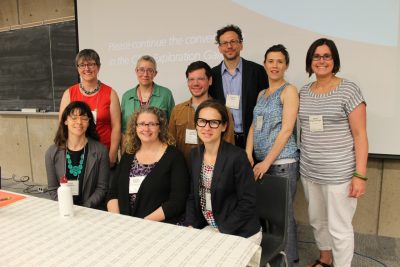Story by Ethan Walker, CFICE Communications Research Assistant; Podcast written and recorded by Kira Locken, CFICE Communications Volunteer
Engaging in community-first campus-community engagement (CCE) is an opportune way for faculty to achieve their goals as researchers and teachers. Charles Levkoe, an academic co-lead for CFICE’s CCE Brokering Working Group and Canada Research Chair in Sustainable Food Systems at Lakehead University, offers a good example of what can be accomplished with a community-first approach.
Listen to the podcast below, or continue scrolling to read the full story! Download a PDF of the podcast transcript.
Prior to entering academia, Charles worked in several community organizations, including non-profits and an agroecological farm. This activity was highly rewarding but also demanding. One of the biggest challenges however, was not having the time to ask the bigger questions about ‘why we do what we do’.
 These bigger questions, in part, are what led Charles to pursue a career in academia. His passion for and experience working as part of various community organizations are what gave him the motivation and skills to put community first when engaging with communities from the other side of the community-campus engagement partnership. According to Charles, being community-first is all about maintaining a close relationship between professors and community partners that is ultimately mutually advantageous.
These bigger questions, in part, are what led Charles to pursue a career in academia. His passion for and experience working as part of various community organizations are what gave him the motivation and skills to put community first when engaging with communities from the other side of the community-campus engagement partnership. According to Charles, being community-first is all about maintaining a close relationship between professors and community partners that is ultimately mutually advantageous.
Charles has had the opportunity to take a community-first approach to all of his research, focusing on the needs and interests of the community. This approach is often extremely demanding; however, if done correctly, it can lead to greater impact. Being community-first allows both parties to build lasting partnerships, which can extend far beyond the short-term intentions of the initial research initiatives.
Being involved with CFICE has also helped Charles’s work as an academic. As an early career academic, CFICE has given legitimacy to his craft.
“With academia, you are often driven to address social needs,” explains Charles. “CFICE has given me the legitimacy to be able to say that this work means something, that it is valuable.”
Furthermore, the connections coming out of CFICE have provided a powerful network that helps Charles further drive community-first engagement.
An example of successful community-first practices in action can be seen with recent Canadian national food policy work. Charles led a team that worked closely with Food Secure Canada to help engage civil society contributions towards a national food policy to help support a healthier, more just and sustainable food system.
According to Charles, the community-first collaboration between community and academia has had a big impact on the project’s success. “Collectively, we have a lot of opportunity to move the needle on some of these issues.”
As for how other faculty members could take that first step in becoming community-first in their engagement efforts, Charles suggests starting with an issue that sparks passion within. “Being community-first is a serious time commitment, but it can be very rewarding. Take some time to think about how you can have an impact, what your interests are, and the skills you can mobilize. It’s not just a short-term endeavor, but something made up of longer-term relationships. It is all about working together to make a collective impact.”
Become more community-first!
To learn more about how to make your work more community-first, check out our list of actions for all community-campus engagement practitioners!
Podcast Sound Clips used under Creative Commons Attribution 3.0:
http://soundbible.com/1968-Apple-Bite.html
http://soundbible.com/853-Typewriter-And-Bell.html
http://soundbible.com/1647-Ovation.html (Also Credit Mike Koenig)
http://soundbible.com/1997-Cha-Ching-Register.html
